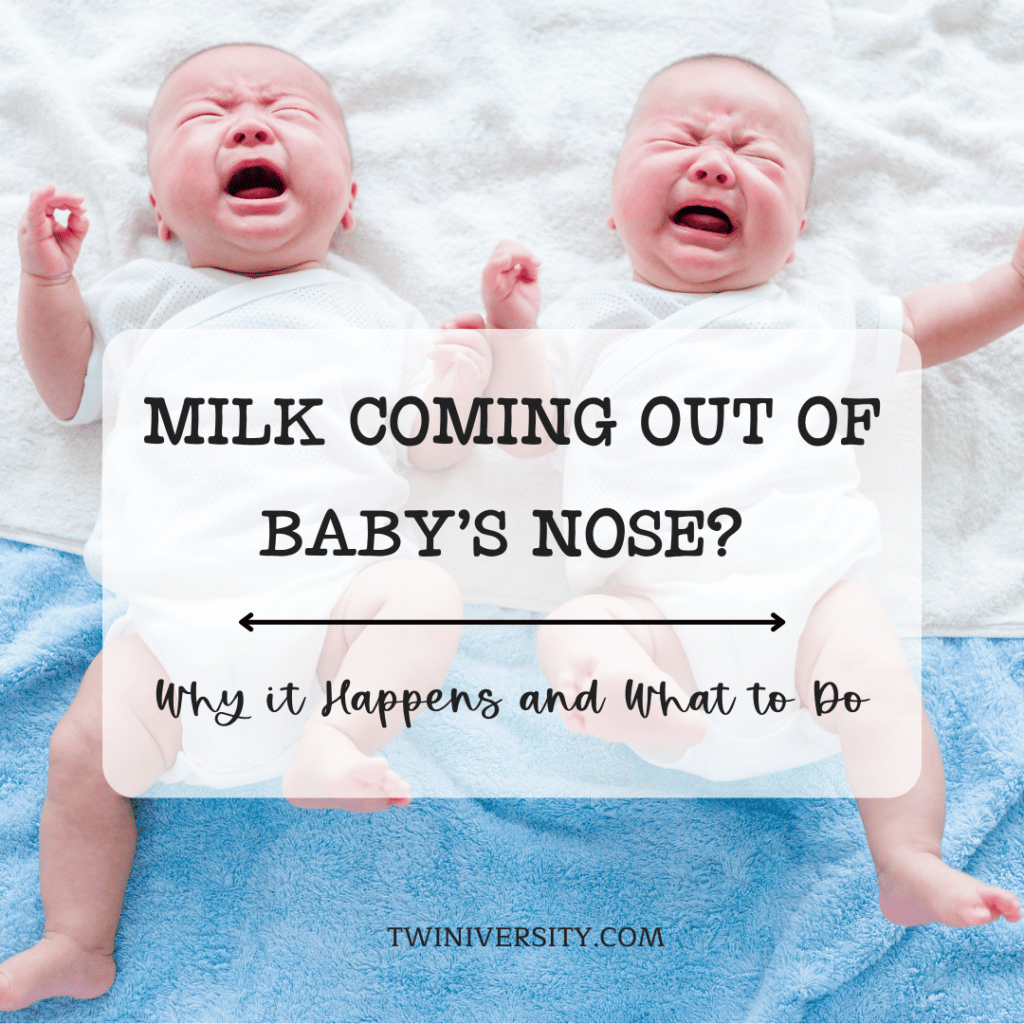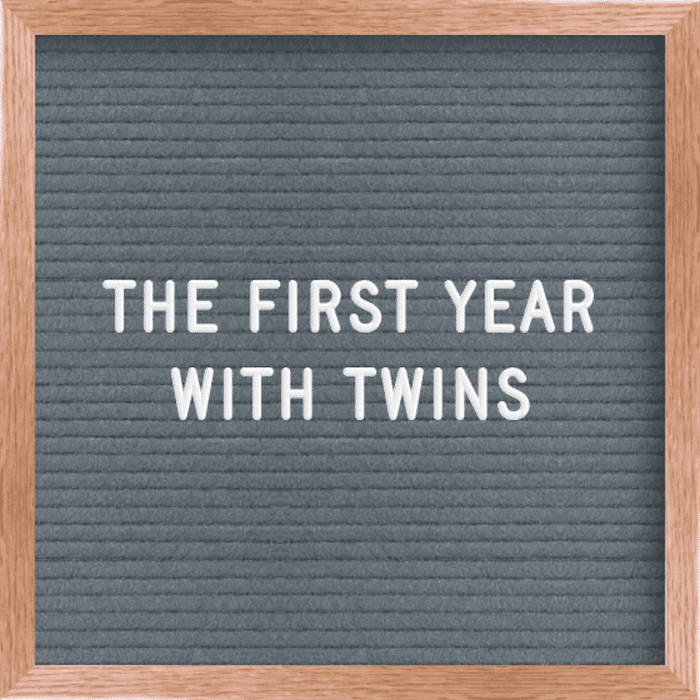Last updated on February 5th, 2024 at 02:39 pm
Is milk coming out of your baby’s nose? Don’t worry, we can help answer some of your questions and assuage your worries. Read below to find out why it might be happening and what you can do about it.
It’s no secret that newborn babies come with a hefty learning curve and getting to know your new tiny human can be a time full of surprises. One of the strangest things you might see while feeding your newborn is breast milk or formula coming out of their nose.
While it might be totally freaky (and gross) at first, milk coming out of your baby’s nose is usually no cause for panic. This is just one of those weird and wonderful parts of new parenthood. Still, you might be wondering how and why this happens and what you can do about it. We’ve got you covered with everything you need to know about milk coming out of your baby’s nose!

All content on this Web site, including medical opinions and any other health-related information, is for informational purposes only and should not be considered to be a specific diagnosis or treatment plan for any individual situation. Use of this site and the information contained herein does not create a doctor-patient relationship. Always seek the direct advice of your own doctor in connection with any questions or issues you may have regarding your own health or the health of others.
Is It Normal for Milk to Come out of Baby’s Nose?
As they learn to suck and swallow milk or formula, babies often make a mess during and after feedings. While most new parents expect spit-up and diaper blow-outs, you might be surprised to see the milk you just fed them come back out through their nose. It can be scary to see this but try not to panic!
Milk coming out of a baby’s nose is totally normal and fairly common in newborns. One study found that 67% of infants 0 to 3 months old experience this at least once. So while it’s gross, it’s just part of being a baby. Most of the time there’s no need to worry, just clean up the mess and move on to baby snuggles.
Stressing out with your infant twins? Let us help! Learn what to expect in the first year with twins, including tips, tricks, and advice from real twin parents who have been there. Click here to learn more… and while you’re at it, check out our twin parent coaching services and Twiniversity shop!
Why Does Milk Come out of a Baby’s Nose?
Newborns are notorious for spitting up, hence all those burp cloths you received at your baby shower. Also known as infant reflux, this is a natural reflex that pushes milk up from the stomach into the esophagus. Often this reflex can cause forceful expulsion of baby’s food, known as spit-up. Since the nose and mouth are connected, instead of coming out of the mouth, the spit-up sometimes comes out the nose. This reflex is not to be confused with Gastroesophegeal Reflux Disease, which is more serious and often requires medical attention to treat.
Known as nasal regurgitation, milk coming out of baby’s nose is most commonly caused by underdevelopment of the digestive tract, namely the lower esophageal sphincter. In all humans, this valve is what prevents stomach contents from going back up the esophagus. However, in many babies, especially twins who are often born premature, this valve has not yet fully developed by birth. Once the valve has developed fully, reflux issues should be greatly reduced.
Other causes of milk coming out of a baby’s nose include:
- Lying flat for long periods
- Swallowing air during feeding
- Overfeeding
- Distractions during feeding
- Cleft palate
- Sneezing or coughing during feeding
Some of these causes can be tough to avoid with infants, who are known to sleep for 16 hours a day and eat any time they’re awake. That said, there are things you can do to help prevent milk from coming out of your baby’s nose.

How Can I Prevent Milk From Coming Out of Baby’s Nose?
The first time you see milk dripping from your baby’s nose, you might wonder what you can do to prevent it from happening. Although some of the causes are unavoidable, there are things you can do to greatly reduce the chances of milk coming out of your baby’s nose.
Address Feeding Issues
Sometimes nasal regurgitation can occur, often caused by breastfeeding issues. These include a bad latch due to tongue or lip tie, overactive letdown, an imbalance of foremilk and hindmilk, or an allergy. Talk to your pediatrician and/or visit a lactation consultant for help.
When bottle feeding, it is common for baby to eat too fast or too much at once. Keep baby on a feeding schedule to avoid overfeeding. Look into paced feeding, a breastfeeding technique that can help bottle-fed babies eat more slowly and reduce reflux.
If spitting up is happening with every feeding, you may want to look into different formulas to help the baby digest better and keep food where it belongs.

Switch up Your Feeding and Nap Positions
Gravity is your friend when it comes to preventing nasal regurgitation and the number one way to reduce reflux is to hold baby upright (close to a 90-degree angle) during feeding. You can achieve this position with different feeding holds, such as the cradle hold or sitting baby up in your lap while feeding. If you need more support, try a bouncy seat or infant feeding chair.
Even though your baby might be milk drunk and sleepy afterward, keep baby upright for at least 15 minutes. This allows their food to settle and begin digesting. Remember to always follow safe sleep practices and avoid using inclined sleepers, and check to make sure they haven’t been recalled. Just hold your baby over your shoulder while they snooze until you can lay them down to sleep.
TWINIVERSITY TIP: Upright positioning can be extremely tough when feeding twin infants, especially when feeding at the same time. Check out our founder Nat’s review of the Table for Two which allows you to bottle feed both babies at once while keeping them upright.
Have you taken your expecting twins class yet? We offer a great class on demand so you can take it on your own schedule! There are so many video modules covering everything from your twins’ baby registry to your first week at home with twins! Sign up today to get started before your twins arrive.
Get the Air Out
Babies need to burp frequently during their feedings to prevent the build-up of air bubbles. These bubbles will grow until they burst, sending food back up the esophagus. To help prevent this be sure to burp the baby often. Experts recommend burping the baby every 2 to 3 ounces.
If baby is having a hard time burping, switch positions until one comes. The best positions include over your shoulder, sitting upright on your lap or laying across your lap face down.
Don’t resume feeding until the baby has burped, even if it’s just a little one. It’s better for baby to be hungry for a minute than to have all their food come out their nose!
When feeding, be sure to keep the bottle at a 45-degree angle and keep the nipple full to reduce air bubbles. And don’t forget to always get a good burp out after feeding time as well!

Try Out Different Feeding Accessories
Every baby is different and they each require unique feeding positions and devices that allow them to suck and swallow breast milk and formula with ease. If your baby is experiencing reflux frequently, try switching up your feeding devices. Look for ones that reduce reflux, including slow-flow nipples and bottles such as the Dr. Brown’s Anti-Colic Options+ Bottle or the Playtex Baby Ventaire Bottle. One thing you want to avoid is using bottle props, as these can lead to overfeeding and more regurgitation.
What Do I Do if Milk Is Coming Out of Baby’s Nose?
It can be super scary when baby starts spewing milk from their nose. First of all, don’t panic! Unless the baby is in distress or having a hard time breathing, simply comfort them, wipe away the spit-up and move on. Then, try to keep them upright for as long as possible. Make note of the amount and frequency of milk coming out of their nose and try one of the above suggestions during your next feeding.
Sometimes regurgitation will happen while the baby is sleeping after a feeding. Your baby may or may not wake up if this happens. Simply clean it up and keep an eye on them in case it happens again. The most important thing to do is monitor how often it happens, try to reduce the risk and report any concerns to their doctor.
Is it Milk or Spit Up Coming Out of their Nose?
Spit-up, also known as regurgitation, occurs when a baby brings up a small amount of milk or formula that they have previously consumed during a feeding. Spit-up is not forceful and typically involves a small amount of milk or formula being expelled from the baby’s mouth. It is a common occurrence in infants and can happen for various reasons, such as overfeeding, swallowing air during feeding, or immature digestive systems. While milk is the substance a baby consumes for nourishment, spit-up is the act of expelling a small portion of that milk.

When Should I Call a Doctor if Milk Comes Out of My Baby’s Nose?
While nasal regurgitation is normal and usually not a cause for concern, you may want to let your doctor know. This is especially true if it happens every time you feed and your attempts to reduce it don’t work.
The biggest risk occurs when the baby is regurgitating more food than they are keeping down. In this case, they are likely not getting adequate nutrition which can impact overall growth, weight gain, and development. If you notice the baby is not gaining or is losing weight, call your doctor immediately.
Rarely, a baby with milk coming out of its nose will need immediate medical attention. If your baby suffers from constant nasal regurgitation, is having a hard time breathing, refuses to eat, or seems distressed while eating, have them seen. You should also monitor their spit-up and report any color or consistency changes to your pediatrician.
Occasionally, milk coming out of a baby’s nose can be due to an undiagnosed cleft palate. If nasal regurgitation still happens regularly despite changing up positioning and equipment, definitely call your pediatrician for an in-depth check-up.
Nearly all cases of reflux clear up by the time baby turns one. If your baby is still spitting up frequently after this point be sure to let their doctor know.

What if My Baby Has Spit up Out Their Nose?
If your baby is spitting up milk or formula through their nose, it can be a cause for concern. While occasional spit-up is common in infants, having it come out through the nose may indicate an issue that needs to be addressed. Follow the above tips to help with this. If it continues, consider seeking advice from your pediatrician.
Don’t Stress Over Milk Coming Out of Baby’s Nose
Feeding your newborn isn’t exactly rocket science, but when issues arise it can make you feel helpless and scared. Try not to stress if your baby has milk coming out of their nose, just clean up the mess and assure your little one that all is well. Start taking steps to reduce the chances of nasal regurgitation and monitor your baby’s food intake and output. If you have any concerns, check in with your pediatrician for extra guidance on how to handle this messy but totally normal phenomenon.












